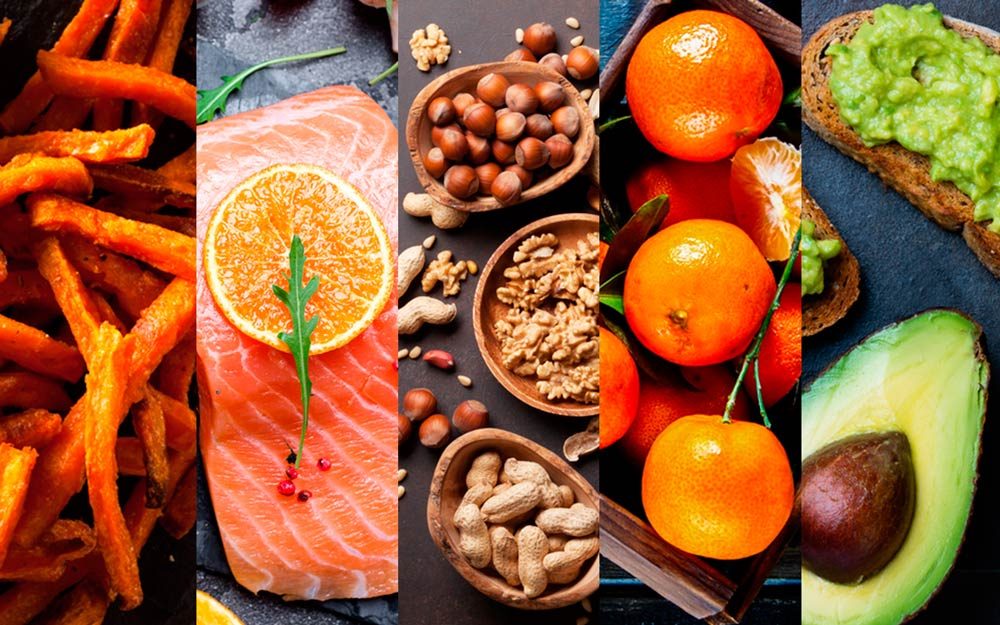Foods to keep your skin healthy

You can’t stop yourself from aging. But you can control how you do it. You may be wondering what foods are good for your skin to keep it firmer and looking younger.
The good news is that if you’re committed to eating healthier you’re probably further along than you think on giving your complexion a youthful boost.
Many foods that benefit the skin contain:
- omega-3 fatty acids
- omega-6 fatty acids
- vitamin E
- antioxidants
Research suggests that these and other nutrients and compounds in certain foods can benefit the skin. Also, hydration is as important for the health of skin as it is for the rest of the body.
While external products can help to treat conditions such as acne, the diet may play a direct role in nourishing the skin and keeping it healthful.
1. Kiwis Fruit
Did you know that kiwis have more vitamin C than oranges? Kiwis are helpful foods for skin health because vitamin C is a powerful antioxidant that help zaps free radicals in cells. Some studies show that vitamin C may protect skin against UV damage, help with the production of collagen, and make skin more hydrated. Eat kiwis when they’re fully ripe, as this is when they have the most antioxidants. Other good sources of vitamin C include blackcurrants, blueberries, citrus fruits, guava, red peppers, parsley, strawberries, and broccoli.
2. Green Tea
For smoother skin, try swapping a cup of coffee for green tea. Green tea is packed with polyphenols, a type of antioxidant found in tea leaves. Polyphenols help to lower the amount of sebum (oil) your body makes, and some evidence shows this makes green tea a good option to treat acne. Green tea also contains flavonoids, which help with DNA repair, and are even shown to help lessen fine lines. One study shows that you’ll get the most flavonoids from green tea if you steep it in cold water for a long time.
3. Olive oil
Among cooking oils, olive oil may be the most healthful choice for the skin.
Results of a studyTrusted Source from 2012 support the more widely held conclusion that a diet rich in olive oil reduces the effects of photoaging on facial skin.
The researchers attribute this effect to monounsaturated fatty acids in the oil, as well as other compounds, such as squalene, which the authors suggest may protect against dryness and damage from free radicals.
4. Water
Water supports the functioning of every system in the body, and it benefits the skin in many ways.
For example, staying hydrated protects skin cells from damage, including that caused by environmental factors. Also, hydration makes it easier for skin cells to absorb nutrients and release toxins.
Drinking more water may be the easiest way to support the health of the skin.
5. Carrots
A good snack choice, these vegetables are in high in beta-carotene, which protects your skin against the harmful rays of the sun. Beta-carotene is what gives plants their orange color and is found in other fruits and vegetables such as apricots, cantaloupe, mango, papaya, pumpkin, and sweet potatoes. Carrots are also a good source of magnesium, which relaxes nerves and muscles. Not getting enough magnesium can lead to poor sleep, and getting enough shut-eye is something that’s always good for your skin!
6. Sunflower seeds
In general, nuts and seeds are good sources of skin-boosting nutrients.
Sunflower seeds are an excellent example.
One ounce (28 grams) of sunflower seeds packs 49% of the DV for vitamin E, 41% of the DV for selenium, 14% of the DV for zinc, and 5.5 grams of protein.
7. Avocados
They are good sources of vitamins C and E, which are two of the many antioxidants that help protect cells from damage. Avocados also contain lutein and zeaxanthin, which some early studies show may help improve skin tone. And avocados are rich in monounsaturated fat, which (like other fats and oils) helps your body absorb certain vitamins, including A, D, E, and K.
8. Tomatoes
Tomatoes are a great source of vitamin C and contain all of the major carotenoids, including lycopene.
Beta carotene, lutein, and lycopene have been shown to protect your skin against damage from the sun. They may also help prevent wrinkling
Because tomatoes are rich in carotenoids, they’re an excellent food for maintaining healthy skin.
Consider pairing carotenoid-rich foods like tomatoes with a source of fat, such as cheese or olive oil. Fat increases your absorption of carotenoids
Things to avoid
The following dietary and lifestyle factors can damage the skin:
- Too much caffeine: Caffeine is a stimulant and a diuretic. Consuming a large amount of caffeine on a regular basis may remove an unhealthful amount of water from the body and dry out the skin.
- Harsh chemicals: To soothe flare-ups or treat sunburn, a person may apply topical products that contain harsh chemicals, additives, or perfumes. These can aggravate many skin conditions, and they may be especially dangerous for people with sensitive skin.
- Processed or refined foods: Foods that contain high amounts of refined sugars and carbohydrates may speed up the skin’s aging process. People looking to protect their skin may wish to avoid these foods.

